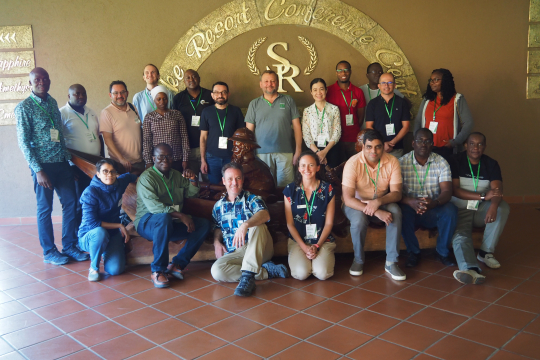The Environment for Development initiative (EfD) conducted a three-day place-based education (PBE) workshop to help improve the pedagogical practice of the EfD researchers who also double as lecturers. This was in partnership with the Teton Science Schools (TSS).
Over 15 participants from the13 EfD centers in the Global South undertook the training facilitated by Leslie Cook (TSS), Kevin Krasnow (TSS), and Oskar Hagvall Svensson (EfD). The workshop preceded the 16th EfD Annual Meeting at the Munyonyo Commonwealth Resort in Kampala, Uganda.
Place-based education links learning and community through increased engagement, student outcomes, and community impact. In essence, the training seeks to encourage the adoption of more place-based principles into teaching practices.
PBE is rooted in the following six principles:
- Local to Global Context - Local learning serves as a model for understanding regional and global challenges, opportunities, and connections. An understanding of self is a starting point to understanding place.
- Learner-Centered - Learning is personally relevant to students and enables student agency. The teacher serves as a guide or facilitator to learning.
- Inquiry-Based - Learning is grounded in observing, asking relevant questions, making predictions, and collecting data to understand the world through economic, ecological, and cultural lenses.
- Design Thinking - Design thinking provides a systematic approach for students to make a meaningful impact in communities through the curriculum.
- Community as Classroom - Communities serve as learning ecosystems for schools where local and regional experts, experiences, and places are part of the expanded definition of a classroom.
- Interdisciplinary Approach - The curriculum matches the real world where the traditional subject area content, skills, and dispositions are taught through an integrated and frequently project-based approach where all learners are accountable and challenged.
Utilizing the community as a classroom
Participants engaged in discussions, shared experiences, and worked in teams to incorporate place-based education in their future lessons. For a better appreciation of using the community as a classroom, participants visited a local fish market at the Ggaba landing site on the shores of Lake Victoria.
Participants expressed gratitude and optimism in PBE saying it was a timely intervention by EfD.
Dr. Aisha Nanyiti from Makerere University, a teacher of development economics, deems regular engagement with students as an essential tool in helping them develop an interest in development issues.
Enhancing what they already teach
“The course introduced me to new ideas like using newspapers as a resource for nudging students to think about policies. The tool of taking students to the field and using the community as a classroom was important, especially to some of us with large classrooms of about 300 students. All these increase engagements, learner outcomes and create community impact.”, explains Aisha.
As a facilitator, Leslie Cook, the Head of Professional Learning at Teton Science Schools, was impressed by their dedication, eagerness, and commitment to being good teachers. “It is exciting to hear the myriad of great ways they’re planning to integrate place-based education principles into modules they are already teaching. Place-based education is not an add-on, but a way to enhance what they are already teaching.”, notes Leslie
PBE is the second in the three-part series under the EfD capacity building and pedagogy program. In 2020, the Fundamentals of Pedagogical Practice was the first course. The third and final stage is due sometime in 2023 at a venue and a time to be communicated.
More information: TSS
By: Karl Kaddu
